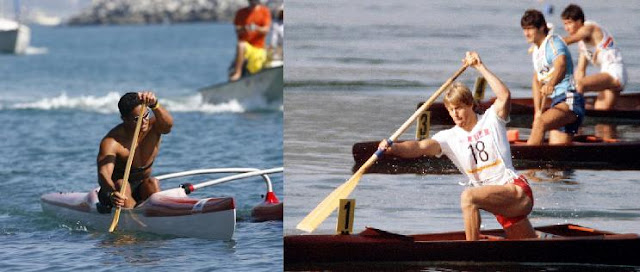To begin, this is what I see when I look around at the sport of SUP at the highest end.
1. Different body types: Example: Thomas Maximus vs Kai Lenny
2. Different paddling styles: Connor Baxter vs Danny Ching
4. Different backgrounds: Outrigger, Surf, Sprint Canoe, Kayak, Wind Surf etc.
SUP does not discriminate against background or body type which really makes it a great sport for anyone to be a part of. This also makes it really hard to use the top athletes in the sport and copy their training techniques or regimes. Do you go to the gym and lift weights to build muscle? Do you paddle all day, every day to build endurance? Do you use cross training to build all around fitness? Do you use technical workouts monitoring heart rate, calories, intensity to maximize efficiency? I think the correct answer is different for everybody.
What makes this sport great is the diversity within the sport and I think that training and technique should reflect that diversity. I think that by taking bits and pieces from top athletes and focusing on your personal strengths and weaknesses anyone can train to be a stronger paddler. Just because Danny Ching's program allows him to win races, it doesn't mean that is the right program for you as well...but if you have the chance to be a world class Outrigger paddler before starting SUP training that might help in your success. Just because Connor Baxter wins big races, it doesn't mean everybody should choke down and paddle 200 strokes per minute....Although on the start it is a great way to accelerate.
I am continuing to try out new training methods and techniques and I'm excited to see the results. I am still learning and I have much more experience to gain but so far, my advice to anyone who is serious about training to becoming a stronger paddler is:
1. Focus on technique first. Learn to be an efficient paddler before you hit the gym or start paddling everyday. All those extra muscles won't help if you can't use them effectively. Find an instructor with a good eye, who asks good questions and helps you focus on your strengths and eliminates your weaknesses.
2. Paddle Often. If you only paddle once a week it is going to difficult to build strong paddling muscles.
3. Set goals. Set yourself some achievable goals to keep yourself on track. These goals do not have to be races or winning. Set fun goals for yourself that include trips and accomplishments.
4. Use your peers. Friends, Family, Trainers etc. Having good people around you will help you achieve your paddling goals. A training partner always makes a hard paddle or gym session more fun. A good trainer will keep you motivated, on track and help you achieve your specific goals.
I didn't want to add this one to my list because it is a little bit cliche, but make sure you are out there for the right reasons. Paddling is fun and a great way to stay healthy and happy so don't let it be a burden. Make sure you take the time to go out for a paddle where you barely go anywhere and spend most of the time chatting and laughing. For example a group paddle with good people last weekend felt like a breeze. Turns out we went 10km and it felt great!
It would be great to hear some feedback on different paddlers training methods. Everyone is different so share what works for you!
This year I am enlisting the help of Challenge by Choice(CBC) in Squamish, BC. CBC has provided me with a personal online training program that is always changing, fun and goal oriented I am looking forward to seeing some results this season. If you are interested in starting a program that is designed for you specifically, get in touch with Jen at CBC. She knows a thing or two about training, has a great gym, great trainers and is a great resource.



